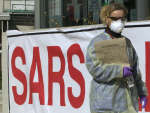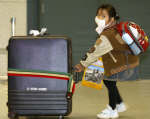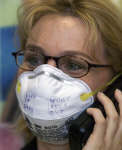Harish Kumar, chairman, Maharaja Appliances, should have been in Guangdong last week striking deals at China's biggest appliances fair.
 But he stayed at home as did 75 per cent of the others due to be there. Kumar usually buys some 20 per cent of his parts from China, many sourced at the fair.
But he stayed at home as did 75 per cent of the others due to be there. Kumar usually buys some 20 per cent of his parts from China, many sourced at the fair.
Now he's looking at alternatives for the future. Says Kumar: "We want to reduce the Chinese component to 10 per cent so we're not too dependent on them in case this SARS (Severe Acute Respiratory Syndrome) thing continues."
Kumar isn't the only person staying away from China and South-East Asia following the outbreak of the deadly virus. National carrier Air-India has been slashing flights to Singapore and Hong Kong after it found its planes were flying more than half empty.
Its losses have already crossed the Rs 7 crore (Rs 70 million) mark.
"We're expecting a further dip. We might have to take a couple of flights off the schedule if the situation gets any worse," says an Air-India executive.
The hospitals are filling up in places like China, Hong Kong and Singapore. And the ripple effect of the infection has already reached Indian shores -- and airports.
A range of industries from shoes and garments to hotels, airlines and consumer electricals has been affected by the deadly impact of the coronavirus in other parts of Asia.
SARS has, in fact, already had a shotgun-like scattered effect. For instance: many private equity deals are hanging in limbo.
A few months ago many equity funds shifted base from Singapore to Hong Kong, which has the second-largest number of cases. Many executives are working from home and they are not about to travel to India to close deals.
Says a senior equity fund executive: "Many Indian companies are asking whether deals can be concluded through a videoconference. Our answer is that nobody will pay you the cheque until you see each other and physically shake hands."
At another end of the spectrum, some garment exporters are also feeling the stitches tightening. Normally, the industry should be gearing for the forthcoming winter season -- about 30 per cent of total business for many Indian companies -- and buyers should be criss-crossing India looking for the right deals.
But buyers often combine business in different countries and fly from India to Singapore or Hong Kong. Now, most won't travel until the SARS scare subsides.
Says Hemant Thakkar, managing director, Mumbai-based Cottex India: "This is the ordering season for winter and if buyers don't come we will be in dire trouble."
In fact, anyone who does business with South-East Asia is feeling the pinch. Many multinationals have their Asian headquarters in either Hong Kong or Singapore and SARS has put the brakes on travel.
In Hong Kong, where about 1,488 cases have been reported and 109 people have died, many executives have started working from home and staying away from office.
Obviously, under these circumstances, the worst hit are the airline and tourism companies which are already reeling from one blow after another. Life for the travel companies has never been back to normal after 9/11.
 The Iraq war had already slowed down travel to Asia considerably. But that was nothing compared to the SARS-effect that has emptied aeroplanes and hotels with devastating swiftness.
The Iraq war had already slowed down travel to Asia considerably. But that was nothing compared to the SARS-effect that has emptied aeroplanes and hotels with devastating swiftness.
At one level, business travellers have postponed journeys and no amount of frequent flyer miles will persuade them back in the air immediately.
A five-man team from Bajaj Electricals, for instance, was also supposed to travel to the Guangdong appliances fair but cancelled at the last minute.
Similarly, the Federation of Indian Chamber of Commerce and Industry has cancelled plans to take part in a meeting in Boao of the Boao Forum, which is touted as an alternative to the World Economic Forum.
FICCI will soon take a decision about whether to take part in a Business Week conference in Shanghai in July. "We hope the cloud will be cleared by July," says Amit Mitra, secretary general, FICCI.
If businessmen are staying at home, the holidaymakers aren't about to take any chances. And that's despite the lure of cheap airfares which have made South-East Asia a popular destination in recent years.
In fact, about 50 per cent of business for tour companies like Stic Travels comes from the South-East Asian region. One industry analyst says that South-East Asia constitutes 30 per cent of travel out of India.
Subhash Goyal, chairman, Stic Travels, says that there have been heavy cancellations for the April-July season and that the number of travellers has fallen by 50 per cent.
Ankur Bhatia, the managing director of Amadeus India -- the world's largest hotel and airline reservation system -- also says there's between a 50 per cent and 60 per cent drop in traffic between April 1 and April 23. Says Bhatia: "This is the worst year for aviation and it seems to be even worse than September 11."
In fact, the future looks even bleaker than the gloomy present. Praveen Chugh, chairman, Travel Agents Federation of India, says that forward bookings for Singapore are down by 65 per cent, Malaysia by 55 per cent and Thailand by 30 per cent. Other agents report similar slowdowns.
"Hong Kong has up to now seen zero bookings for the May-June vacation season. In April itself we witnessed a dip of 75 per cent to 80 per cent in bookings for Hong Kong," says Vikas Khanduri, regional manager (north India) Cox & Kings.
The world's most profitable airlines like Cathay Pacific and Singapore Airlines have, obviously, been devastated by the SARS epidemic.
Cathay Pacific has cut capacity by 45 per cent and reduced the number of flights to 23 destinations.
Even that may not be enough because it has only 6,000 passengers on its planes daily compared to 30,000 before SARS made its appearance in Hong Kong. Similarly, Singapore Airlines has cut flights by 19 per cent.
Both airlines say they haven't cut flights to India yet. But Air-India has moved swiftly and suspended all flights to Singapore and Kuala Lumpur from Delhi.
Air-India's flights from Mumbai to Singapore and Kuala Lumpur could also be chopped in the near future.
 What's more, it is only flying three flights weekly to Hong Kong and even that may be brought down soon. Indian Airlines, by contrast, is still flying to Singapore.
What's more, it is only flying three flights weekly to Hong Kong and even that may be brought down soon. Indian Airlines, by contrast, is still flying to Singapore.
For the hotel industry, it has been a particularly cruel blow. The hoteliers were having their first good season in two years when they were struck down by SARS.
Till a few weeks ago, most leading hotels in Mumbai and Delhi had occupancy rates of between 80 per cent and 90 per cent.
That's fallen now to about 60 per cent or even less. But it's thought to estimate how much this has been caused by SARS because the lean season has also begun.
Says Homi Aibara, consultant, Mahajan & Aibara: "We really have had a great four months. Now industry is quaking because there's so much uncertainty regarding SARS."
India is, of course, in a much better position than its giant next-door neighbour China. And anyone doing business in China obviously is in a high-risk position.
That's why I S Paul, managing director, Drish Shoes is contemplating the next few months with extreme trepidation. The company sells about 30 per cent of its finished leather in China and Paul expects orders to fall by anywhere around 10 per cent to 20 per cent.
Says Paul: "With the overall economy getting affected and about $10 billion of GDP in this region being wiped out, consumer demand will go down and so will that of shoes."
Mind you, there are businessmen hoping that China's discomfort could be India's opportunity. Jagdish Hinduja of Gokuldas Exports which owns the Weekender chain and label predicts that the Chinese will stumble and that about 5 per cent of their production will shift to other countries.
He hopes that India will be poised to pick up some of that. Says Hinduja: "This is a major opportunity for India. We are already getting queries from companies who used to buy from China."
Surprisingly, India's most globalised industries like software services and business process outsourcing seem to be relatively unaffected so far.
Arun Kumar, managing director, Hughes Software says that the company hasn't been hit yet. Similarly, Manoj Kunkalienkar, executive director, ICICI Infotech says that the company's office in Singapore are functioning normally. However, he says the company could face difficulty if SARS continues for another 20-30 days.
Says Kunkalienkar: "A lot of the chip-making facilities and components for PCs are located in this area and new orders are not coming. This could have an impact on supply chain in the hardware industry."
Nasscom also insists that its members don't appear to be hit yet. Only a few companies have apparently withdrawn staff from Hong Kong and Singapore. Also, the fact is that South-East Asia and China are still small markets for the software industry.
Says Sunil Mehta, vice president, Nasscom: "APEC region is small in terms of our total software exports. It's only 12 per cent of total exports and our presence in China is insignificant."
Some executives even predict that India will be untouched by the storms raging around it -- unless the virus spreads. Scott Bayman, president, GE India scoffs at suggestions that people will stop doing business in India because they can't travel here.
Says Bayman: "The Indian economy will not be impacted by the economic impact of SARS. The economy was not impacted at all by the Asian economic meltdown."
It is obviously too early to panic. But there isn't much ground for optimism either. Even developed countries like Canada have found it almost impossible to control the spread of the virus and some economists have predicted that Canada's growth will fall by about 1.5 per cent.
And the Hong Kong economy could be devastated by the coronavirus. On Wednesday, the region's chief executive announced a $1.5 billion package to bail out companies.
On the same day the Hang Seng Index fell to its lowest levels since 1998. Singapore has already announced a stimulus package.
If the virus does reach India our ramshackle medical facilities would quickly be swamped and the disease would be tough to control. So, we can only hope that the coronavirus isn't coming our way.
Additional reporting: Amrita Dhar, Arti Sharma and Bipin Chandran.





